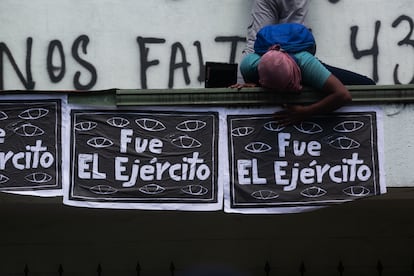Eight Mexican soldiers accused of forced disappearance in Ayotzinapa case returned to prison
A federal court issued arrest warrants Thursday, thus quashing the order of a district judge that, as of January 21, allowed the soldiers to continue the ongoing judicial process on bail


The eight soldiers accused of the forced disappearance of 43 students in the town of Ayotzinapa in the state of Guerrero in 2014, who were released last week, will be returned to prison. A federal court issued the corresponding arrest warrants Thursday, thus quashing the order of a district judge in the State of Mexico that, as of January 21, allowed the soldiers to continue the ongoing judicial process on bail. The lawyer for the former military personnel assured the press that his clients will voluntarily present themselves to the authorities.
Gustavo Rodríguez de la Cruz, Omar Torres Marquillo, Juan Andrés Flores Lagunes, Ramiro Manzanares Sanabria, Roberto de los Santos Eduviges, Eloy Estrada Díaz, Uri Yashiel Reyes Lazos and Juan Sotelo Díaz, the eight accused, were arrested in June 2023. The head of the second district court for federal criminal proceedings in Toluca, Raquel Ivette Duarte Cedillo, asked for their provisional detention for the crime of forced disappearance. It is not known what crimes they are accused of in the new arrest warrant, but according to a protected witness of the Attorney General’s Office (FGR) quoted by the newspaper La Jornada, the soldiers had alleged links with the Guerreros Unidos criminal organization.
On August 21, the soldiers’ defense requested a change from provisional detention to a biweekly visit to the court, which was accepted by Duarte Cedillo, who also granted provisional release last August to another soldier accused in the crime, General Rafael Hernández. In addition, the judge imposed as conditions the payment of a bail of 50,000 pesos, the retention of his passport and a ban on approaching witnesses in and victims of the case, as well as a travel order preventing him from entering the state of Guerrero. Since their arrest in June, the eight soldiers had been held in Military Camp 1-A, in Mexico City, where they will return after the new judicial decision.
Most of the eight military personnel held the rank of private at the time of the attack on students in Ayotzinapa in 2014. They were all part of a Secretariat of Defense (Sedena) convoy that was patrolling Iguala, the town where the students were kidnapped, during and after the attack. The FGR assumes that their presence in the convoy was in response to their links with the criminal group that eventually became the main suspect in the case, Guerreros Unidos.
The release of the eight soldiers triggered a new clash between the judiciary and the government, antagonists that have been engaged in a long public battle in recent years. “We are not surprised by the position of the Federal Judiciary (PJF) in the Ayotzinapa case. Among its priorities has never been to seek justice, nor to find the truth. On the contrary, it has dedicated itself to obstructing and hindering the development of the process,” read a statement from the Ministry of the Interior published on January 22. “Once again, Judicial Power uses procedural pretexts to set aside justice. Cloaked in technicalities, they do not consider the rights of the victims to truth, justice, and prevention.”
However, neither have the government’s actions regarding the case in recent months been exempt from criticism. On the ninth anniversary of the attack, last September, relatives of the students demonstrated in Mexico City amid a breakdown in the relationship between the authorities and the families, who accuse the government of closing ranks with the army. The families demanded the authorities hand over hundreds of documents concerning military espionage. Without them, they argue, the investigation is at a standstill with no new leads to follow.
Sedena denies the existence of the files, despite the fact that the independent group of experts (GIEI) that has investigated the case claims that they are in the possession of the military. The GIEI eventually left Mexico in July, frustrated by the army’s reluctance to provide information. In early January, the victims’ families met again with the presidential commission. They demanded the return of the GIEI and, again, that the military hand over the documents. Neither request went forward, further aggravating the relationship between the two sides and threatening to paralyze the investigation.
The case has become a tangle of conflicting interests with dozens of detainees and a slow-moving judicial process. The truth — the whereabouts of the missing students — seems almost impossible to uncover despite the efforts of their families.
Sign up for our weekly newsletter to get more English-language news coverage from EL PAÍS USA Edition
Tu suscripción se está usando en otro dispositivo
¿Quieres añadir otro usuario a tu suscripción?
Si continúas leyendo en este dispositivo, no se podrá leer en el otro.
FlechaTu suscripción se está usando en otro dispositivo y solo puedes acceder a EL PAÍS desde un dispositivo a la vez.
Si quieres compartir tu cuenta, cambia tu suscripción a la modalidad Premium, así podrás añadir otro usuario. Cada uno accederá con su propia cuenta de email, lo que os permitirá personalizar vuestra experiencia en EL PAÍS.
¿Tienes una suscripción de empresa? Accede aquí para contratar más cuentas.
En el caso de no saber quién está usando tu cuenta, te recomendamos cambiar tu contraseña aquí.
Si decides continuar compartiendo tu cuenta, este mensaje se mostrará en tu dispositivo y en el de la otra persona que está usando tu cuenta de forma indefinida, afectando a tu experiencia de lectura. Puedes consultar aquí los términos y condiciones de la suscripción digital.








































